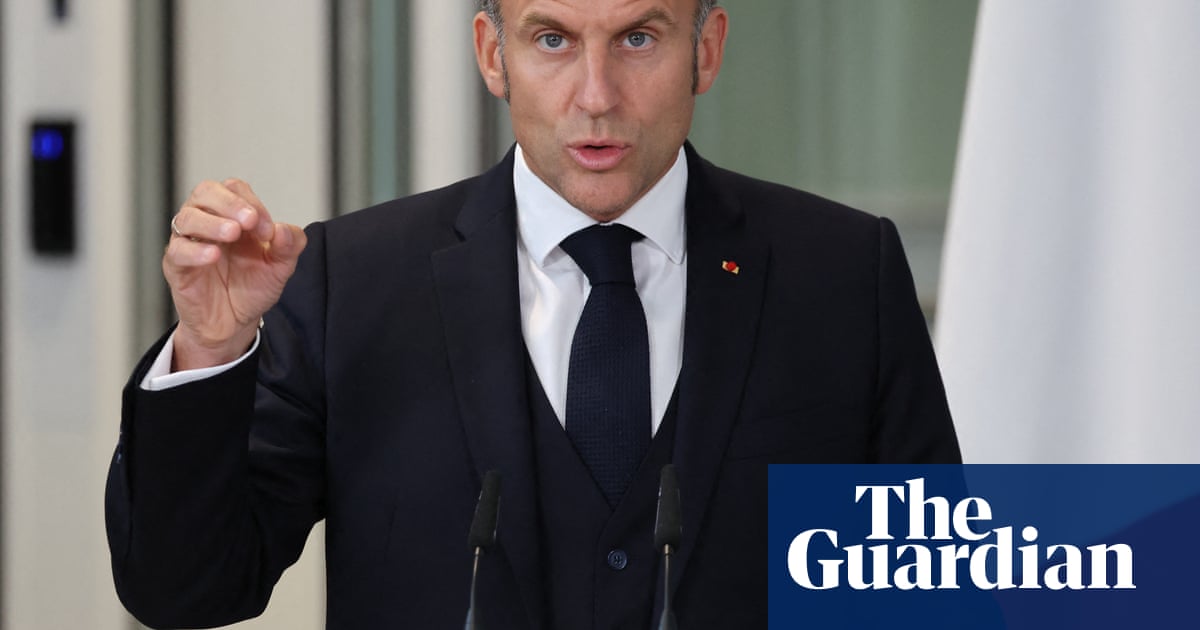A UN summit on a two-state solution for Palestine and Israel – postponed by the Israel-Iran war – has been rescheduled for 28 and 29 July, but it is not expected that the French president, Emmanuel Macron, will attend, making it less likely that it will trigger a series of high-profile announcements on recognition of a Palestinian state.
Macron, who last week told UK parliamentarians a two-state solution was “the only way to build peace and stability for all in the whole region”, has been trying to build momentum for recognition of a state of Palestine by a wide group of countries, but the lack of movement in ceasefire negotiations between Hamas and Israel is making such decisions more complex.
Israel and the US both oppose recognition of a Palestinian state, and have been advising UN delegations not to attend the UN conference in New York. Israel has said that recognition would be seen as a reward for Hamas terrorism.
The conference originally slated for June was postponed when the Israeli attack on Iran created a security crisis across the Middle East. The conference has a set of working parties that are designed to ease the path to a two-state solution, including plans for future Palestinian governance, economic renewal and challenging the narratives of hate.
French sources insisted decisions on recognition had not been made, and a subsequent event in Paris would provide the platform.
Recognition was discussed last week at the Anglo-French summit, where Macron made two public appeals without setting a timetable. Macron called for recognition in his speech to UK parliamentarians and in his closing press conference. “With Gaza in ruin and the West Bank being attacked on a daily basis, the perspective of a Palestinian state has never been put at risk as it is,” he told MPs.
“And this is why this solution of the two states and the recognition of the state of Palestine is … the only way to build peace and stability for all in the whole region.”
The joint declaration issued by Macron and the UK prime minister, Keir Starmer, simply reaffirmed their commitment to “recognising a Palestinian state, as a contribution to a peace process”. And they pledged to “work together to support its development and the realisation of a two-state solution”.
Le Monde reported at the weekend that neither Macron nor the crown prince of Saudi Arabia, Mohammed bin Salman, would attend the UN conference, and that the summit would instead be led by foreign ministers.
That does not preclude Macron making his long-trailed announcement at a different point. The French preference has been to make the historic recognition announcement jointly with the UK, and possibly Canada.
Speaking about the issue at length to parliament’s foreign affairs select committee, the UK foreign secretary, David Lammy, referred to the country’s role in shaping the Middle East through the Balfour declaration, saying: “I would prefer that the United Kingdom is part of a process, particularly if you look at the history, including our relationship with Balfour and the two communities that were effectively brought together at the birth of the Israeli state.”
He added: “A ceasefire might be the beginning of a process, and I suspect that our French colleagues are also waiting to see whether there is a ceasefire in the next few days. That would be the beginning of something, particularly if it is a permanent ceasefire and not a pause.”
after newsletter promotion
Lammy said the decisions of some European countries to recently recognise a Palestinian state had not led to changes on the ground in the West Bank and Gaza, but he admitted it was a judgment call and said he had some sympathy with those who argued that the pace of building Israeli settlements on the West Bank was putting the existence of a Palestinian state in question.
He stressed he did not see a wider normalisation between Saudi Arabia and Israel taking place unless Israel made some concession on the recognition of Palestine.
“From my conversations with the Saudis and the Saudi foreign minister, normalisation will be impossible to achieve until there is a ceasefire and unless there is tangible progress on two states. Frankly, I commend my Saudi counterparts for holding true to that,” he told MPs.
Separately, foreign ministers from Israel and Palestine are expected to attend a dinner in Brussels on Monday.
The Israeli foreign minister, Gideon Saar, and his Palestinian counterpart, Varsen Aghabekian, have both confirmed their attendance at an EU-Southern Neighbourhood ministerial meeting, but it is not clear if they will meet or talk to one another. The aim of the Brussels meeting is to strengthen relations between the EU and its 10 partner countries in the Mediterranean region.
